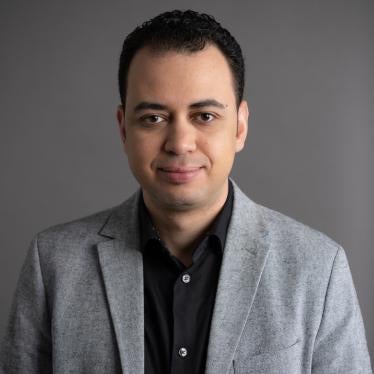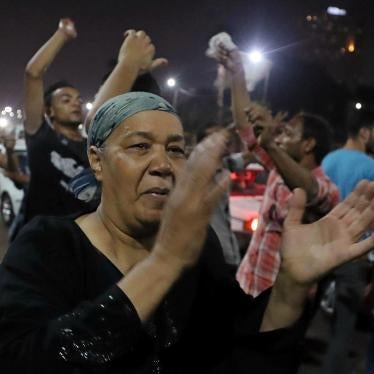Mohamed Abdellatif, a young Egyptian dentist, has been a friend of mine since we went to the same secondary school in Giza, just a few hundred meters from Cairo University, where we also studied together. He went to dentistry school and I went to medical school, on the same campus in al-Kasr Ainy which hosts Cairo University Hospitals. In college I joined several campus opposition activities, but Abdellatif did not. I naively thought I was better than he was. I was not.
That was between 2002 and 2007, when former President Hosni Mubarak faced growing opposition to his long autocratic rule that marked the beginning of his fall. When the January 2011 uprising rocked the country, we were new doctors. Abdellatif’s passion revolved around his career as well as the wider policies around his profession, including the abysmal conditions in which doctors work in Egypt, and that lead thousands of them to leave the country.
But Abdellatif pursued his fight inside the Dentists’ Syndicate, Egypt’s main dentists’ union. In a fierce battle, he won a seat in the syndicate council in 2012, beating a Muslim Brotherhood candidate in elections that were free thanks to the 2011 uprising. In 2014, Abdellatif ran again and became the syndicate’s assistant secretary general. He resigned in 2016 for personal reasons.
Abdellatif is now in jail. Security forces arrested him at his home on September 1 because of the “Egyptian Doctors Are Angry” online campaign he supported demanding better government policies for his colleagues and profession. I saw Abdellatif’s Facebook posts and admired his courage. Such criticism of the government in the last years of Mubarak’s rule would probably bring you few consequences or perhaps none. But under Abdel Fattah al-Sisi’s rule, one post can cost you your freedom for months or years.
Abdellatif’s courage met with the expected brutality. Armed men in civilian clothes and police in uniform stormed his family home, seized passports, cash and laptops. and took Abdellatif to an undisclosed location for nine days. This is how security agents behave in the al-Sisi era. Prosecutors later ordered him detained and charged him with “aiding a terrorist group.” When Abdellatif’s father told one of the officers who raided their home that an online campaign about doctors’ conditions did not justify all of that, the officer said: “Your son is inciting against us,” referring to the hashtag about angry doctors.
President al-Sisi likes to portray the relentless crackdown he has pursued against his opponents as a campaign targeting “terrorists” and “conspirators.” But as a doctor-turned-human-rights-activist I know how arbitrary these accusations against peaceful dissidents are. And Abdellatif’s detention embodies such arbitrariness.
Abdellatif was not the only one arrested recently. On September 20, scores of scattered protests erupted across the country in a rare public challenge to al-Sisi’s iron grip. Over the following two weeks, his security agents arrested over 3,300 people, according to local rights groups. Many were taken from their homes or picked up on the streets as police arbitrarily stopped passers-by to check social media posts on their phones. The detainees include people with mental health conditions, and over 150 children and scores of women.
It wasn’t only protesters who were arrested. Security forces also arrested at least six journalists as they were covering the protests, even some known for supporting al-Sisi. Many people who happened to be around the protests were also rounded up. Several lawyers trying to assist detainees were arrested too.
The recent events bring to mind the 1979 iconic satirical Egyptian film, “We Are the Bus People,” in which an altercation with the ticket collector on a bus lands two men who were in the wrong place at the wrong time in jail, where they are detained and tortured for political reasons.
Those arrested since September 20 include, for example, Hassan Nafaa, a well-respected political science professor at Cairo University. His books, some of which I have read, resemble the basic introductory texts that many political science freshmen have to read. His arrest apparently stems from his tweets and participations in TV shows to present his political analysis.
Not only protesters and activists were arrested, but some said they were abused including well-known activists like Israa Abdel Fattah who said she was badly beaten and threatened with sexual assault to give up her mobile phone pin code after she was abducted.
But one need not be a political activist, a journalist, or an opposition figure to be jailed in Egypt these days. Relatives of dissidents living abroad have also become targets. When the well-known 2011-generation activist Wael Ghonim, now a California resident, criticized Egyptian intelligence agencies in Facebook videos, security raided his family’s home in Cairo on September 19 and arrested his young brother Hazem, a dentist.
When Haitham Abu Khalil, an opposition TV anchor based in Istanbul, criticized the government, the authorities arrested his older brother, Amr, 57, a well-known psychiatrist, at his clinic, and ransacked his mother’s home in Alexandria. These are only two examples.
The message is clear: No one is immune. And if you live abroad, security can still arrest your brother, mother or father.
Since al-Sisi took power in late 2013, his government has arrested and prosecuted tens of thousands of people. The government never released any comprehensive figures but the arrest of over 3,000 people these last few days shows what the government is capable of. When talking about activists, it is becoming easier to answer the question “who is NOT in jail?” in Egypt than who is in these days.
Abdellatif was just a dentist who wanted better conditions for doctors and patients. But like the majority of those arrested, he is accused of being a “terrorist.”
Egyptians overcame Mubarak’s tyranny and they may well do so with this Sisi’s, brutal tactics. Meanwhile tens of thousands of Egyptians are in prisons or forced into exile, as I, myself, suddenly found my country too unsafe for saying what I say. If al-Sisi’s allies in Washington and other capitals make their support conditional on improving human rights conditions, freeing peaceful activists and everyone else caught up innocently in this web, maybe the pain can be shortened.










